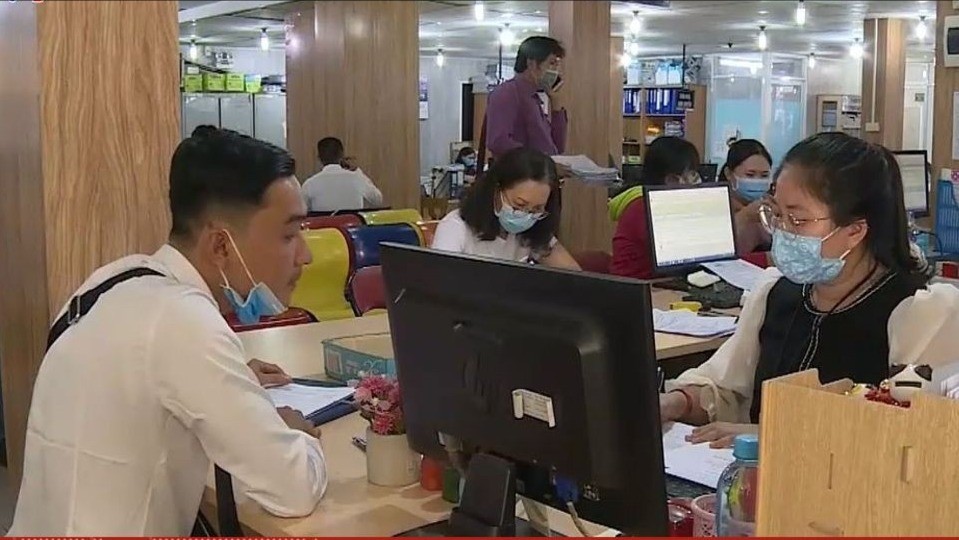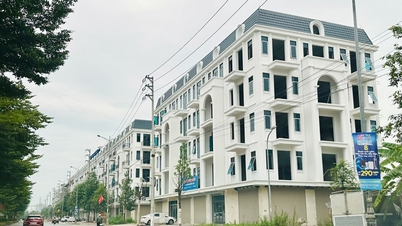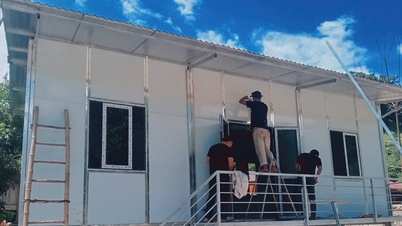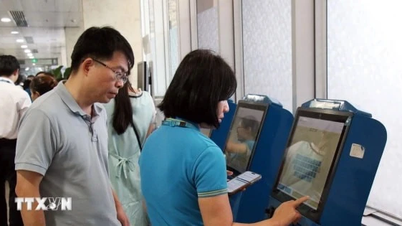Proposal to increase family deduction to 17 million VND
In the draft resolution of the National Assembly Standing Committee on adjusting the family deduction level in personal income tax, applicable from the 2026 tax period, the Ministry of Finance proposed two options to adjust and increase the family deduction level.

Option 1, based on the increase in the consumer price index (CPI), the individual taxpayer will be deducted 13.3 million VND/month for himself and 5.3 million VND/month for each dependent. With option 2, based on the growth rate of GDP and average income per capita, the deduction will be 15.5 million VND/month for himself and 6.2 million VND/month for each dependent.
If approved, this Draft Resolution will officially take effect from the date of signing and will be applied uniformly nationwide starting from the 2026 tax period. A representative of the Ministry of Finance said that the Ministry is currently soliciting public opinions. In particular, option 2, which is calculated based on income and GDP per capita, received more consensus than option 1.
Mr. Nguyen Duc Chi - Deputy Minister of Finance said: "The majority agrees with option 2, which means the family deduction level is adjusted according to the growth rate of average income per capita and the growth rate of average GDP per capita. The Ministry of Finance is continuing to complete and determine the exact data based on the GDP growth rate from 2020 to present."
Raising the deduction level is necessary, because the family deduction level of 11 million VND/month applied since 2020 until now is considered to be no longer suitable for actual spending, especially in big cities like Hanoi and Ho Chi Minh City.
According to the records, most employees and experts agree that option 2 is more reasonable. However, even with option 2, opinions still do not fully reflect the actual spending pressure of employees and hope that the family deduction level can be raised higher.
The new school year has come, and Mr. Thai and his wife are preparing to buy books, uniforms, and school supplies for their children. Every month, the basic expenses for education and food cost more than ten million VND. Not to mention the times when the children are sick. With the pressure of spending in Hanoi, the couple has to save every penny to have a small savings, to prepare for future incidents.
Mr. Vu Hong Thai - Cau Giay Ward, Hanoi City said: "I hope the family deduction will be increased to about 17 million and 7 million for dependents. At that time, we will also have a little savings to buy a house".
Chung and his wife live in a remote province and work in Hanoi. Each month, the rent alone costs nearly ten million VND, not to mention other living expenses. He hopes that the family deduction can be increased to reduce the current spending burden.
Mr. Doan Van Chung - Phu Dien Ward, Hanoi City shared: "10 million VND for rent a month, the remaining 5 million VND for monthly living expenses. I think that deduction is not enough".
According to experts, the two options proposed by the Ministry of Finance still do not fully reflect the actual income and living expenses of taxpayers.
Currently, low-income earners are allowed to buy social housing if their monthly income is no more than 15 million VND for single people. Thus, less than 15 million VND/month is considered low income, the family deduction level must be increased further.
Mr. Nguyen Van Phung - Member of the Executive Committee of the Vietnam Business Law Association (VBLA) commented: "The target for buying low-income housing should be raised to 15 million. The current living standard of people with the current price level, I think 15.5 - 16 million is still low. In particular, we must consider people's consumption needs. Consumer demand and the structure of consumer goods are now different from 10 years ago. Therefore, we must also redefine this level. If it is higher, it will be better for everyone."
Commenting on raising the family deduction level, the Ministry of National Defense proposed to increase it to 17.3 million VND for taxpayers and 6.9 million VND for dependents. The Ministry explained that in 2020, when the current deduction level was issued, the basic salary was 1.49 million VND/month. Up to now, the basic salary is 2.34 million VND, an increase of more than 57%. Therefore, the family deduction level also needs to increase accordingly.

Proposal to include medical and educational expenses in family deductions
Currently, the application of a common family deduction level for all regions, urban and rural, is also revealing many inappropriate points. Many localities have proposed to adjust the family deduction level to suit the practical living conditions of the region and add reasonable specific deductions such as education, health care, and housing expenses.
Ms. Que has two small children. Each month, the tuition fee for each child alone is about 3 million VND. That does not include books, class funds, and photocopying documents. Medical expenses are even more expensive. If the child is just a little sick, she will have to spend tens of millions of VND. Therefore, she really wants to deduct medical and educational expenses before calculating taxes.
Ms. Do Thi Dao Que - Ha Dong Ward, Hanoi City confided: "Education and medical expenses are basic, inevitable, and almost always fixed. Young children are often sick, older children are less sick, but those are regular expenses."
Mr. Vu Hong Thai - Cau Giay Ward, Hanoi City said: "People cannot be sick without going to the hospital. Or cannot not go to school. So those two things are mandatory, so it is reasonable to deduct them before considering family deductions."
People raising young children or caring for elderly parents will have different spending levels than single people. Therefore, experts say that instead of applying the same family deduction level for all subjects, applying specific deductions such as education, health... helps tax policy reflect the living situation and actual payment ability of each individual.
Associate Professor Dr. Le Xuan Truong - Head of the Tax Department, Academy of Finance commented: "I think that the deduction for education and health is a step in line with the trend of personal income tax reform in countries around the world. This place not only supports taxpayers to cover very important expenses. We pay more attention to people's health, consistently implementing the policy of considering education and training as the top national policy".
Including medical and educational expenses in family deductions with full invoices and documents will reduce the burden on taxpayers. Especially in the current context of rising housing prices, tax policies will be a motivation for young people like Mr. Thai to save more, so that they can soon have a place to "settle down and make a living".
In addition, according to experts, if the family deduction is still calculated based on the current CPI, it will continue to be outdated. Because it may take several years for the CPI to increase by 20%. Meanwhile, the price of goods increases every year, but the family deduction level does not change, causing the amount of tax payable to not decrease, causing disadvantages for millions of current wage earners. Therefore, many opinions suggest that it is possible to propose that the Government announce and adjust the family deduction level annually or every two years, instead of basing it on the current 20% CPI fluctuation level. This will ensure a flexible tax policy, changing in accordance with the fluctuations of social life.
Regulations on family deductions in different countries
Many countries in the world today are applying a family deduction system that is designed quite flexibly, including many different deductions in addition to the standard amount for the individual and dependents. This helps reduce the personal income tax burden for people, especially those with high essential living expenses.
In Thailand, the main deductions include personal deductions, dependent deductions, and other expense deductions. The basic deduction for the taxpayer is 60,000 baht/year, equivalent to 40 million VND. The deduction for dependent children is 30,000 baht/person and there is no limit on the number of children. In addition, Thailand also allows deductions for many other expenses, including life insurance and health insurance, maternity expenses, education, etc.
Similarly, Singapore's family deduction policy is very detailed and focuses on social goals, such as promoting lifelong learning, caring for the elderly and building a family. Specifically in the education sector, the maximum deduction is 5,500 SGD/year, equivalent to 112 million VND, regardless of the number of courses attended. The condition is that the course must be aimed at helping the taxpayer serve his/her profession or improve his/her knowledge at work, not for hobbies or entertainment purposes.
Source: https://baolaocai.vn/de-xuat-dua-chi-phi-y-te-giao-duc-vao-giam-tru-gia-canh-post879774.html




![[Photo] Dan Mountain Ginseng, a precious gift from nature to Kinh Bac land](/_next/image?url=https%3A%2F%2Fvphoto.vietnam.vn%2Fthumb%2F1200x675%2Fvietnam%2Fresource%2FIMAGE%2F2025%2F11%2F30%2F1764493588163_ndo_br_anh-longform-jpg.webp&w=3840&q=75)











































































































Comment (0)